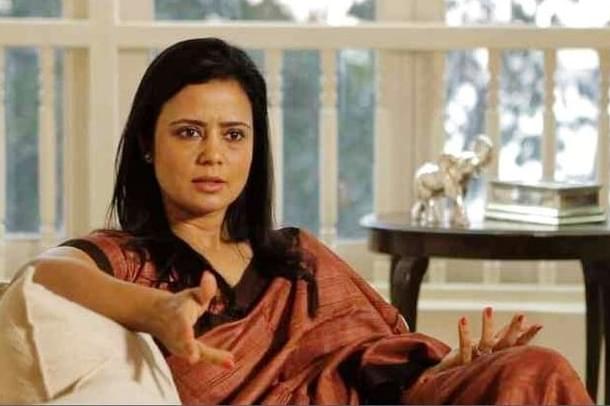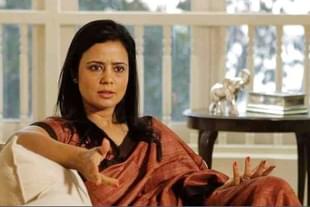Politics
Goa: Mahua Moitra Says Trinamool’s Strategy Hinges On Preventing Hindu Consolidation
Jaideep Mazumdar
Feb 12, 2022, 11:36 PM | Updated 11:36 PM IST
Save & read from anywhere!
Bookmark stories for easy access on any device or the Swarajya app.


Trinamool’s Mahua Moitra has officially confirmed what has long been known about the Trinamool’s poll strategy.
In an interview to The Times Of India, published in the newspaper’s Goa edition Saturday (read this), Moitra has admitted that the Trinamool’s electoral strategy has been to divide the Hindu vote.
She said this in response to the interviewer’s observation that even though the Trinamool positions itself as an alternative to the BJP, it has split the non-BJP votes in Goa. To this, Moitra replies: “We have to function as per the reality of Goa. In North (Goa), our alliance partner is contesting 13-14 seats, which Congress isn’t capable of winning. In those 14 seats, MGP is head-to-head with BJP. We have prevented a consolidation of the Hindu votes by tying up with the MGP….”.
The MGP that Moitra refers to is the Maharashtrawadi Gomantak Party which ruled Goa for the first 18 years after the Portuguese were ousted from the coastal state in 1961. The MGP was the party of choice for Hindus, especially the non-Brahmins who suffered a lot of deprivation under Portuguese rule.
But over the decades, the MGP started losing its support base to the BJP. The party has allied with the Congress and the BJP in the past. The MGP ditched the Congress and joined hands with the BJP before the 2012 Assembly elections where it bagged three seats. It was part of the Laxmikant Parsekar (BJP) government, but walked out of the ruling alliance just before the 2017 polls because the BJP rejected its demand for replacing Parsekar.
The MGP won three seats in 2017, and decided to join the NDA again. Two of its MLAs were given ministerial berths and in 2019, the MGP’s Sudin Dhavalikar was made the deputy chief minister in the Pramod Sawant government (after incumbent chief minister Manohar Parrikar’s death).
But nine days later, when the two other MGP MLAs defected and joined the BJP, Dhavalikar was dropped from the ministry. Angry with the BJP for engineering defections from his party and unceremoniously dropping him from the ministry, Dhavalikar found in the Trinamool a convenient ally to take his revenge against the saffron party.
What Mahua Moitra left unsaid in the interview was that by propping up the MGP in the Hindu-dominated North Goa constituencies, it is hoping to split the Hindu vote and, thus, spoil the BJP’s prospects.
This strategy has been practised by the Trinamool for a long time in Bengal and was articulated succinctly before the Assembly polls in the state last year. The Trinamool’s credo in 2021 was: ‘majority of minority and minority of majority’.
This (winning formula) is: get a majority of the minority (Muslim) votes and a portion of the majority (Hindu) votes to win the elections. Muslims form about 30 percent of Bengal’s electorate, and the Trinamool has always tried its best to prevent a split in Muslim votes.
At the same time, it has done its best to divide the Hindu votes. And in order to prevent the consolidation of Hindu votes, the Trinamool has often pursued divisive agendas as far as the Hindus are concerned.
In Goa, too, the strategy is the same. Christians (mainly Catholics) constitute about 25 percent of the electorate in the coastal state. The Trinamool’s game plan, put into action as soon as it forayed into the state in September last year, was to consolidate the Christian vote.
This is evident from the fact that it put a premium on engineering defections of Christian leaders from other parties, especially the Congress, into the Trinamool. Former chief minister Luizinho Faleiro was one of the first to leave the Congress and join the Trinamool. The Trinamool also got many other Christians--politicians as well as prominent personas like Goa-origin tennis star Leander Paes--to join the party.
Many in the Trinamool’s 69-member state committee, announced in mid-January this year, are Christians. “The Trinamool’s (Goa) state committee has been constituted in a manner to send a clear message to Christians: that the party will accord primacy to the minority community,” said political analyst Pramod Narlikar.
The Trinamool had also hoped to get the Goa Forward Party (GFP) to merge with it. The GFP, a small party that won three seats in the 2017 Assembly polls, has considerable support amongst Hindus in some pockets of the state. This merger, the Trinamool hoped, would help in dividing the Hindu vote.
But the GFP walked away from the merger talks with the Trinamool at the eleventh hour and joined hands with the Congress, enraging Trinamool chief Mamata Banerjee who decided to teach GFP president Vijay Sardesai a lesson and got her party to unilaterally announce Luizinho Faleiro’s candidacy from Sardesai’s Fatorda Assembly seat (read this).
It is a different matter that Faleiro put his foot down and protested the unilateral announcement about his candidature. And he withdrew his nomination from Fatorda, causing embarrassment to the Trinamool. It is also a different matter that the Trinamool’s ‘divide (Hindus) and rule’ strategy is most unlikely to work in Goa.
Moitra had earlier this month put out a tweet asking BJP MPs to drink gomutra shots before her participation in the debate on the President’s address in Parliament. Her conduct in the Lok Sabha during her speech earned her rebuke from the Speaker, and the rebuke was endorsed by all parties, including her own.
During the campaign for the Assembly polls in Bengal last year, BJP MP Giriraj Singh accused Mamata Banerjee of sheltering Rohingyas in Bengal and said she belonged to the ‘Rohingya clan’. Moitra in her acerbic reply said Singh belonged to the ‘chotiwala rakshasa clan’ (see this). Choti is the tuft of hair that Brahmins traditionally sport and rakshasas are demons in Hindu texts.
In another response to Uttar Pradesh chief minister Yogi Adityanath who warned Trinamool goons attacking BJP workers and supporters, Moitra derisively called Yogi ‘Gudduji’ and said he rules over a commune of ‘vanar senas’ (see this).
Moitra is seen as unabashed in her Hindu-bashing but, again, that is another matter and of little consequence when compared to the poll strategy of her party to divide Hindu votes.
Jaideep Mazumdar is an associate editor at Swarajya.




